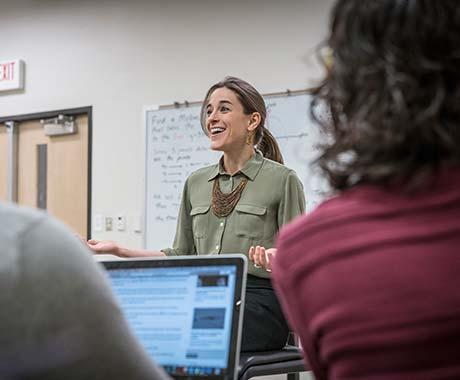Story Highlights
- First-year students must create relationships with a professor who cares
- Create time and space for intentional student touchpoints
- Base chats on successes rather than missed deadlines
When first-year students arrive on campus, they leap into a flurry of activities designed to ease their college transition. And while these programs can help foster student engagement, universities that focus on large events during orientation are missing a more valuable tool: namely, meeting and building a relationship with a professor.
When Gallup asked more than 75,000 college graduates to reflect on their campus experiences, we found that alumni who strongly agree that a professor "cared about them as a person" are more engaged in their work, more emotionally attached to their alma mater, and experience higher levels of wellbeing.
Strategic orientation programs recognize the value of creating these ties as soon as students arrive on campus, given the vitality of supportive professor relationships for long-term student success.
How Caring Transforms Student Outcomes
Gallup research reveals that six core college experiences strongly relate to important long-term outcomes, including engagement in careers and wellbeing after college.
Among these experiences is a deceptively simple factor. Remarkably, graduates who strongly agreed that a professor cared about them as a person were 1.9x more likely to be engaged at work and 1.7x more likely to be thriving in their wellbeing.
And students who strongly agree that a professor cared about them as a person are 6.2x more likely to be emotionally attached to their alma mater. So, forging genuine student-faculty bonds creates alumni who, years later, are still wearing their college sweatshirts and serving as the school's top recruiters.
Graduates who strongly agreed that a professor cared about them as a person were 1.9x more likely to be engaged at work and 1.7x more likely to be thriving in their wellbeing.
Alas, despite the power of these relationships, Gallup's research shows that only 27% of college graduates strongly agree that they had a professor who cared about them as a person. (Of note: 63% of college graduates strongly agree that a professor made them excited about learning, so this key experience is in healthier shape.)
With clear evidence that strong faculty relationships boost alumni engagement and wellbeing, a key question emerges: How can colleges integrate faculty into student affairs programming to foster these types of partnerships across all areas of the school?
Build Meaningful, Not Transactional, Relationships
When student affairs leaders plan first-year programs (and beyond), they should create time and space for building intentional, caring connections between students and faculty. During these conversations, faculty can focus on telling students what is right with them, rather than what is wrong.
Rare is the professor who intentionally focuses on a student's weakness, but students are too often told what's wrong with their habits and work. Too many office-hour chats center on missed deadlines or disputed grades, rather than the student's unique abilities.
Imagine the power of inverting this norm by celebrating what's right with each student. Imagine a world where faculty and students work side-by-side to celebrate students' strengths. Imagine how such conversations would allow students to feel cared for and developed by faculty through structured conversations. Such moments in time can change students' lives.
Creating touchpoints -- that is, intentional strengths interventions -- between faculty and students is vital for those conversations to be effective. While spontaneous faculty conversations are beneficial, for the best CliftonStrengths for Students initiative, the more that those touchpoints are woven into what the school is already doing well (programmatic strengths), the better.
Too many office-hour chats center on missed deadlines or disputed grades, rather than the student's unique abilities.
Admittedly, this requires hard work, and is not a perfect panacea, but it does provide a boost in student support. When schools create strategic, strengths-based touchpoints in partnership with mentors and professors, they establish a powerful foundation for students to build on and thrive in their wellbeing.
So, when leaders craft orientation and student affairs programming for next year, they must weave intentional faculty touchpoints into their calendars and start building those relationships on day one. Students crave relationships that won't just impact them on campus, but that will also improve their engagement and wellbeing for a lifetime.
Each year, Gallup partners with more than 1,000 schools to help more than 700,000 students know who they are by using CliftonStrengths for Students. Through these interventions, students learn how they can apply their strengths to affect their engagement and wellbeing, at school and beyond.
Partner with Gallup to create a thriving and engaged campus:
- Learn about how you could build more intentional touchpoints into your students' experiences.
- Discover our CliftonStrengths for Students Campus Champions Course to learn about strengths in relation to measurable outcomes.
- To develop engaged and thriving students and watch your campus transform, visit here.





